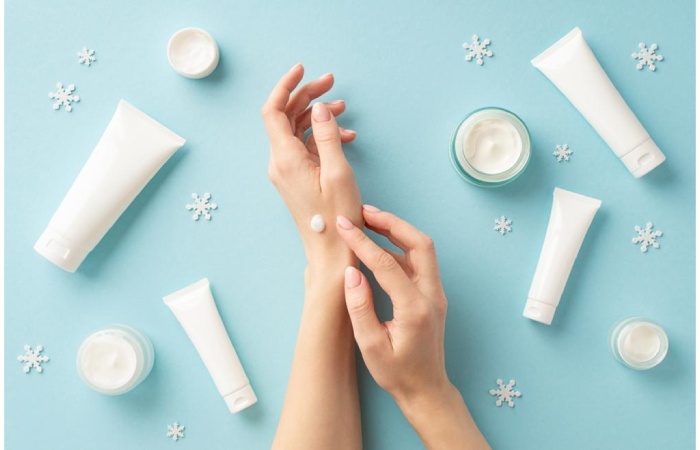Nearly everyone’s skin becomes dry in the winter — but that doesn’t mean that you are doomed to months of chapped and peeling skin. In this skincare 101 guide, we explain why skin becomes dry in the winter and what the signs of dry skin are. Then we offer practical tips to help prevent and treat dry skin during the colder months to keep your face smooth and supple all year round.
Table of Contents
Why Does Skin Get Dry in Winter?
Your skin becomes dry when it’s not sufficiently moisturized and hydrated. Winter weather can contribute to dryness in several different ways. First all, cold air holds less moisture than hot air. This means that your skin can’t attract water from the air, and instead the air pulls moisture out of your skin, drying it out in the process.
Even if you spend almost all your time indoors in the winter, heating systems strip the moisture out of the air, further drying out your skin. Many people also take long baths and showers in the winter in an effort to get warm and cozy. Unfortunately, prolonged water exposure dries out the skin, and hot water makes the problem worse.
Cold weather is also extremely harsh on your skin. Wind, snow, and ice can dry it out and even damage your skin barrier. Sun exposure during the winter can also lead to sunburn, which dries out the skin. In fact, if you live in an area with a lot of snow, the sun reflects off the white expanse, increasing your UV exposure.
What are the Signs of Dry Skin?
There are multiple signs of dry skin to look out for during the winter and also all year round. In many cases, your skin will feel different, and you will also be able to see the dry patches as well. Here are the signs of dry skin you should know:
- Feeling of tightness or itchiness
- Rough texture
- Flaky or peeling patches
- Fine lines or cracks
- Deeper cracks that may bleed
- Discoloration on the dry patches
- Ashy look and texture
- Sensation of stinging or burning
- Inflammation and irritation
- Possible infection if left untreated
Dry skin can occur anywhere on the body, though it’s most common on the face, hands, feet, elbows, and knees. Dry skin is more common in older people since your oil production slows down as you age. Climate and genetics also play a role in the development of dry skin. However, anyone can get dry skin at any point in their life. Read on to discover how to treat dry skin in the winter.
How to Treat Dry Skin in Winter?
Choose the Right Cleanser
Cleansing can be the most drying step of your skincare and body care routine, which is why you need to choose a gentle yet purifying face cleanser. After washing your face, your skin should feel clean and refreshed, not tight and stripped of moisture. You should also wash your face in lukewarm water, limiting its exposure to both very hot and very cold temperatures. Rinse your face quickly and keep showers and bath time to a minimum as well to stop the water from drying out your skin.
Hydrate Inside and Out

If you struggle with dry skin during the winter, you need to make sure that the skin is well hydrated and contains plenty of water content. To do this, use facial sprays, toners, and serums that contain humectants like hyaluronic acid and glycerin. These natural skincare ingredients attract water and help your skin to stay plump and hydrated. You should also drink plenty of water to ensure that your skin is getting enough hydration from the inside out as well. If you live somewhere with a very dry climate, then you might also want to run a humidifier while you sleep at night to prevent your skin from drying out.
Moisturize Regularly
You also need to make sure that the skin’s natural balance of oils is well-maintained, which will help to slow water loss from the skin. Moisturization is absolutely key for this step. We recommend choosing a thicker moisturizer to use during the winter, especially at night. If you have extremely dry skin, you might also want to incorporate a facial oil or use a healing ointment that contains petrolatum and urea.
Sunscreen Is a Must
You should still be wearing sunscreen in the winter, even if the sky is overcast or you are inside all day. This is because your skin is still exposed to UV rays all year round, which accelerates premature aging and also dries out your skin. Sunscreen should be applied to all exposed skin, not just your face but also your neck, chest, and hands. This is especially important if you participate in snow sports, since the glare off the snow can lead to intense sunburn even when the weather is cold.
Exfoliate Gently
When your skin gets dry, you may be tempted to blast it with exfoliators in order to remove the peeling flakes. While we understand the urge, over-exfoliating will seriously dry out your skin and worsen the problem. It’s okay to keep exfoliating in the wintertime, but we recommend switching to less powerful products and reducing the frequency as well. For instance, if you were previously exfoliating every other day, then you might want to drop it down to 1-2 times a week in the winter instead.
Lip and Hand Care
The skin on your lips and face are exposed to the elements a lot, and they are often the first parts to become dry and chapped. To help prevent this, you should be applying a lip mask all throughout the day, not just when you go to bed at night. You should also be applying a lightweight hand lotion every time you wash your hands, plus a thicker hand cream at night while you sleep.

